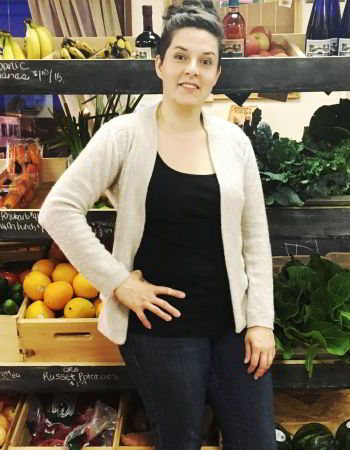This post is part of our Guest Picks series, featuring members of our library community sharing their favorite books and movies.
"I certainly never imagined that when I opened Nourishing Traditions at our local library almost nine years ago that in less than a decade I would open the doors to a natural foods store, but I am certainly glad that I did." — Kathy Craddock, owner of Kickshaws Downtown and Kickshaws Kitchen
Kathy lives in Spotsylvania County, Virginia, with her husband, two kids, chickens and three dogs. She and her husband, Richard, own Kickshaws Bakery in downtown Fredericksburg, focusing on local, organic products and foods for special dietary needs. Here, she shares her thoughts on some of her favorite books:
Years ago, in the midst of chronic illness and autism, we thought that we were feeding ourselves and our family pretty well. On my journey navigating my autoimmune and my son’s sensory issues, I turned towards our nutrition to see what I could do to help our bodies. Through that path, I relied on many lectures, farm visits, nutritional specialists, and, of course, books to lead me in the right direction.
One of the very first books I looked at regarding nutritional changes was Nourishing Traditions, by Sally Fallon. Mrs. Fallon is the founder of the Weston A. Price Foundation, which focuses on traditional foods and food preparation methods to lead to optimum health and wellness. It is a great guidebook to begin a whole foods education or a refresher for anyone.
Leading almost directly from Sally Fallon’s Nourishing Traditions is a more directed study in small batch (not scary!) fermentation with Fermented, by Jill Ciciarelli. Jill makes fermentation so much less daunting by pulling together lots of resources and easily digestible (see what I did there: digestible . . . fermented) information to really get you on your way to fermenting. She focuses on small, very manageable batches of ferments, making fermentation accessible to everyone. We learned how to brew kombucha for the first time through Fermented and then moved on to kraut and other fermented veggies.
Working as we had been on improving gut health, I wanted to learn more about nutrition and supplementation for improved health, especially with our son. Several years ago, I was pleased to attend a lecture with Dana Laake about children’s nutrition and supplements to support ADHD and autism. I was excited to hear what Laake had to say about various changes that can be made to help children on the spectrum cope with certain issues like sensory integration dysfunction. Her book, ADHD and Autism Nutritional Supplement Handbook, is an awesome resource for anyone who is facing challenges understanding small changes in diet, vitamins and minerals, and how they can greatly affect children. The book is designed to either be read in its entirety or used as a reference manual, broken up by issue, disorder, or behavior and tells how to address it naturally.
Another cornerstone for my family on our path to wellness has been growing our own food. I don’t think there is anything much better than heading out to the garden first thing in the morning and harvesting some fresh veggies to add to a nutritious breakfast scramble. Cindy Conner’s book, Growing a Sustainable Diet, really does wonders to help you understand, think through, and plan out the best way to grow for your family’s needs, not only during the growing months but also to preserve the harvest through the colder months. Cindy is also a Virginia native, which makes her information pertinent for growing in our climate.
Both Joel Salatin’s Folks, This Ain’t Normal and Michael Pollan’s In Defense of Food are amazing books that really get into depth about the history of food in the United States, the changes that have occurred, and what the future holds for our national food systems. Joel Salatin, as a farmer and owner of Polyface Farms in Swoope, Virginia, discusses our access to whole, unadulterated foods from the field, and Pollan, as a scientist and researcher, shares his point of view as a consumer. Both shed light on topics that many of us probably don’t want to but need to know about.
When focusing on nutritional density in food and what works best for what body type, I discovered that an ancestrally based diet is best for me. That includes very few grains, lots of vegetables, fermented foods, healing foods, such as bone broths, and responsibly raised, non-GMO, local meats. My two very favorite books are Michelle Tam’s Nom Nom Paleo and Russ Crandall’s Ancestral Table. If I had to describe Nom Nom Paleo in one word, it would most definitely be "fun." The book is packed full of easy to follow recipes (our kids make them!) with great background stories and comics of the author and her family that are hilarious. When our copy arrived, the kids each took turns paging through the book, back to front, for fun and chose some recipes they wanted to make immediately. It remains the kids’ favorite cookbook in our house, whereas my favorite is definitely Ancestral Table. Ancestral Table focuses on many basic comfort food recipes, such as shepherd’s pie, onion rings, and French onion soup, but also has traditional plates from other cultures such as kimchi, bibimbap, saag paneer, gnocchi, and borscht. Both books make eating whole, healthy, nutritionally dense foods simple and easy to do.
Last, but in no way least, Slow Food Nation, by Carlo Petrini, focuses on, of course, Slow Food. Slow Food, as defined by Slow Food International, which was founded by Carlo Petrini in 1986, is food that is good for the Earth, good for those who raise it, and good for those who eat it. It is food that is grown in our backyards, respecting the impact on our ecological systems and the plants and animals in it, and begs us as human beings to slow down. When we can see what and where our food comes from and how it is raised, we can truly understand what the importance is to the land around us and for our own bodies. Slow Food is why we opened Kickshaws Downtown Market and, subsequently, Kickshaws Kitchen. We not only wanted to make an impact as a family in our practices of buying and consuming but wanted to teach others the importance of these decisions while increasing accessibility to these foods.
The last decade has been a long journey for us, making changes in our family that have resulted in greatly improved health and wellness, but also leading us to make the decisions that we have to support our community and local agriculture. I certainly never imagined that when I opened Nourishing Traditions at our local library almost nine years ago that in less than a decade I would open the doors to a natural foods store, but I am certainly glad that I did.
Here is Kathy's recommended reading list, along with her comments for each title from the article above:
focuses on many basic comfort food recipes, such as shepherd’s pie, onion rings, and French onion soup, but also has traditional plates from other cultures such as kimchi, bibimbap, saag paneer, gnocchi, and borscht. . . . make(s) eating whole, healthy, nutritionally dense foods simple and easy to do.
Fermented and then moved on to kraut and other fermented veggies.
Folks, This Ain’t Normal and Michael Pollan’s In Defense of Food are amazing books that really get into depth about the history of food in the United States, the changes that have occurred, and what the future holds for our national food systems. Pollan, as a scientist and researcher, shares his point of view as a consumer. Both shed light on topics that many of us probably don’t want to but need to know about." Also available on audio CD, in large print, and as a DVD program.
Nom Nom Paleo in one word, it would most definitely be 'fun.' The book is packed full of easy to follow recipes (our kids make them!) with great background stories and comics of the author and her family that are hilarious. Also available as an eBook.



